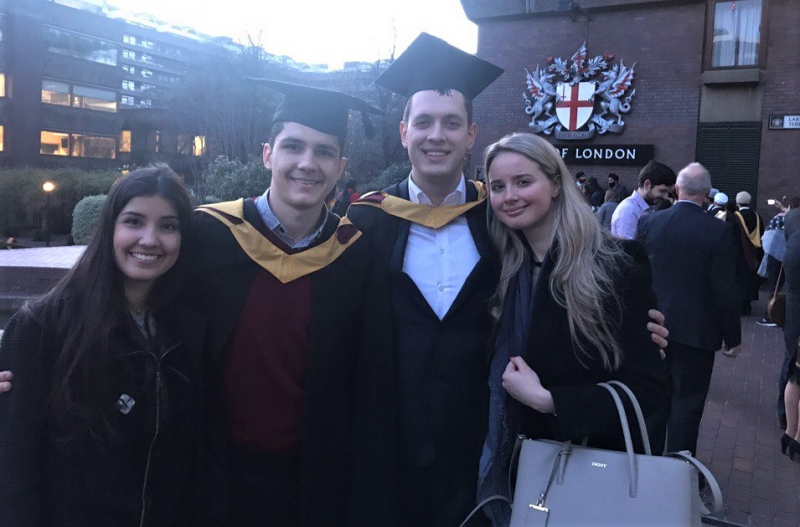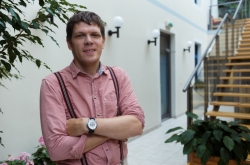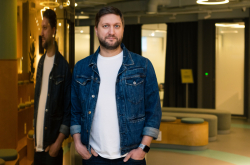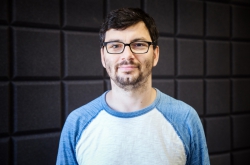You graduated from ITMO in 2014, having studied at the “Information security” program of the School of Computer Technologies and Control. Why did you choose to study there?
In my school days, I became an award winner of the All-Russian Olympiad in mathematics, so I didn’t have to take entrance examinations to a university. I based my choice on a friend’s recommendation: I knew a programmer who told me about several strong universities to apply to, among which were ITMO and St. Petersburg State University. Then, I wanted to become a more flexible programmer, so I decided to pursue an educational path that would allow me to become one.
How did the knowledge you got at the university help you to pursue your career?
On the whole, I started working in my professional field during my Master’s years at ITMO University. At that time, I got a position of a C# programmer at the Yumasoft company, and this is where I got my first practical knowledge in the field of IT.
From the standpoint of academic training, it were the basic courses that proved to be most useful. In my first year, I learned C++, which came in handy at my job. Today, I work in the field of finance, and I have to say that it was my university knowledge of advanced mathematics that helped me develop in this field.
How did you come to the decision to move to Great Britain?
My girlfriend, who graduated from the Higher School of Management at St. Petersburg State University, did an internship at Morgan Stanley, and then found full-time employment at this company. Right after I finished my Master’s program in Russia, she invited me to London. I decided to get an education in Great Britain as well and joined a Master’s program at City, University of London.
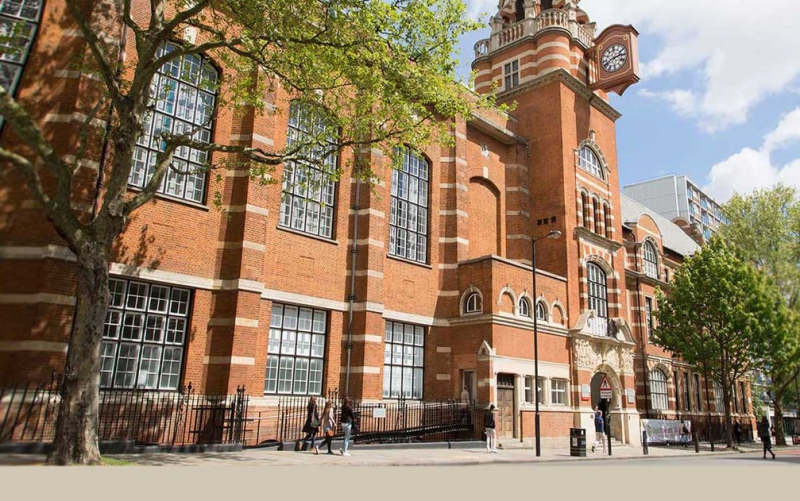
What are the key features of education in Great Britain and Russia that you can mark out?
As for my Master’s program at City, University of London, it had both advantages and drawbacks. The program took eight months only, we had four courses each semester, i.e. we studied for an hour and a half for four days a week. So, the program was quite short. I have to note that in Great Britain, every university decides for itself on how to organize their programs, but all place much focus on individual work. So, students are given only about 25% of the course as lectures.
In Russia, I really like the lecturers: they are wonderful specialists who are very good at teaching. At British universities, the common approach is when a professor does everything by the book: they have a plan, they come to the lecture, read over what they are supposed to and leave. The entire educational process is strictly regulated: you know for sure what you get credits for. The infrastructure is very good, there are many computer classes, and also such rules as that there should be one place per every student at the library. For that reason, the library occupies an entire building, and students go there to study individually.
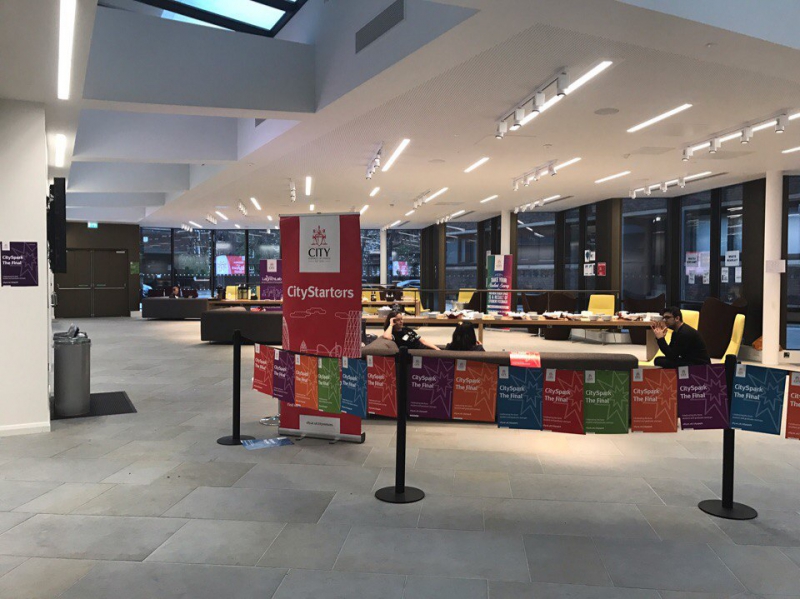
You are currently working at a major hedge fund. Why did you become interested in financial technology?
Yes, I work as a C# programmer at the Quantitative Development Department of Arrowgrass, a major hedge fund that manages 15-20 billion dollars. My department focuses on collecting, processing and analyzing financial data, and my tasks revolve around writing programs for the needs of traders, portfolio managers and the Risk Management Department. This is quite a hard job that calls for skills in analyzing vast amounts of data, and I sometimes have to do it all by myself. What’s more, there are 12 programmers in my team, and nine of them are very experienced professionals with more than 15 years of work experience at various banks.
On the whole, the field of finance is quite a promising one for programmers in Great Britain. It's a well-paid job, and, as opposed to some other fields, there are career opportunities. As for me, I also find it attractive because it gives me an opportunity to develop not just my programming skills but skills in mathematics as well.
What’s more, the field of finance dominates the British IT labor market. So, if you don’t like it, I advise you to look for a job in a different country. Surely, there are job offers from IT giants like Facebook, LinkedIn, Google and the like, but the overall number of them is a lot less.
How many job interviews did you attend? And what does one have to account for in order to successfully pass them?
Back during my Master’s years in Great Britain, I attended tens of job interviews at different banks. So, the idea that I would’ve marked as the most important one is that you have to be very thorough when preparing for an interview.
To begin with, every time that you send your resume to a company, you have to write a motivation letter of about an A4 page in size. In this letter, you have to show that you are interested in the position you are applying for, and prove that the company needs you by stressing your strong points. At the interview, you also have to show that you are really interested in getting the job, and you have sufficient background. This might even be more important than the skills you have. The best way to show your interest and motivation is to find a person who is already working for the company and state them as your “referral”, i.e. someone who’s recommended the company to you. You should also consider attending some event organized by your potential employer: this is a good way to establish useful contacts.

Interviews at major banks and some consulting companies usually take four stages. At the first one, you submit your resume and a motivational letter. Then you have to do some tests: on logical thinking, knowledge of mathematics and the English language. This stage is quite easy, as you can prepare for it by solving sample tests in advance.
The second stage is a phone interview. One or two of the company’s employees can call you, and you’ll have to tell them why you got interested in this particular position. This time, they’ll also be asking the more technical questions.
The third stage is conducted onsite. It takes about four hours and includes an interview with an HR specialist, when they can ask you how you would behave in this or another situation. What is more, you have to pass one or two technical interviews, when different employees will test your skills and knowledge.
Finally, there’s a stage that Russian-speaking candidates find the hardest: a group interview. At this stage, they give you a description of a real task on several A4 sheets of paper, and 10 or 15 minutes to read it through in order to take part in a discussion afterwards. Most Russians who studied English at school or took some course start to panic when they see this much information: they fail to read it all through and feel at a loss. Before coming to London, I spent two years studying English with a native speaker and then completed a Master’s program in Great Britain. But even with this kind of training, it was hard for me. So, it’s only practice that can help you succeed. I can give no other advice.
On the bright side, if the people who interview you see potential, they can well make the choice in your favor. What’s more, they value diversity, i.e. prefer it when their employees have different nationalities, religion, etc. Also, if the company is aimed at developing markets, or Russia in particular, then it will, of course, be interested in a specialist who’s well-acquainted with the specifics of such a market. So, there are scenarios when the company will be more interested in you than in your competitors.
What are the peculiarities of working at British companies, and what were the key differences that you had to deal with?
It’s hard for me to comment on the behavior of the British because I'm working in the field of finance. Our company buys millions worth of shares on a daily basis and processes enormous volumes of data where any mistake can cost serious money. On the one hand, it’s very interesting to look at how professionals develop financial models and forecast the cost of shares, but on the other, we are constantly working under pressure, which makes the environment that we work in not really friendly. By all means, the British are very polite and tactful, but business relationships are more strict. You have to be ready that your colleagues will rarely share information, and see you as a competitor, as they believe that everyone is equal on the market, and all of you sell your services to the company.

Based on your personal experience, can you give our students some advice on how to pursue their careers: what should they focus on while studying, which opportunities are not to be missed if they want to build a successful career, a career abroad included?
I clearly saw how valuable soft skills are. You have to understand that every year, lots of really good Indian programmers come to Great Britain, and they’ve dedicated their lives to becoming good programmers and building a career in London. In regard to hard skills, the competition is very high.
Therefore, those who have good soft skills get a competitive advantage. You should also pay sufficient attention to communication skills and studying English, as what we learn at school, hear in movies or at popular lectures is different from what you’ll have to deal with in real life. So my advice for those who want to go work abroad is to start learning the language as early as possible and use every chance to practice with native speakers.
Another project that you continue to develop is vuzopoisk, a platform that helps applicants choose a university. How did you come up with this idea?
I started to develop this project three years ago when I was still in Russia. At that time, my goal was to get a grasp on technologies, study what backend and frontend are about and so on. What’s more, I wanted to learn the ways of working with data, and I eventually completed a project that now regularly collects data from ten different sources. I continued to actively develop it while studying here in London. Nowadays, I spend less time working on it because of my work, so I delegate some of the tasks to other specialists.
When I only planned to launch vuzopoisk, I believed that its topic, i.e. choosing universities, was didn’t get enough attention. Now, one of the main tasks that I set myself as part of my project is to help Russian students find good universities, foreign universities included. Judging by my experience in London, I see that many companies help British students make more conscious decisions: they offer analysis, translate the experience of other students, and so the students in Great Britain are more thorough in their choice of education.
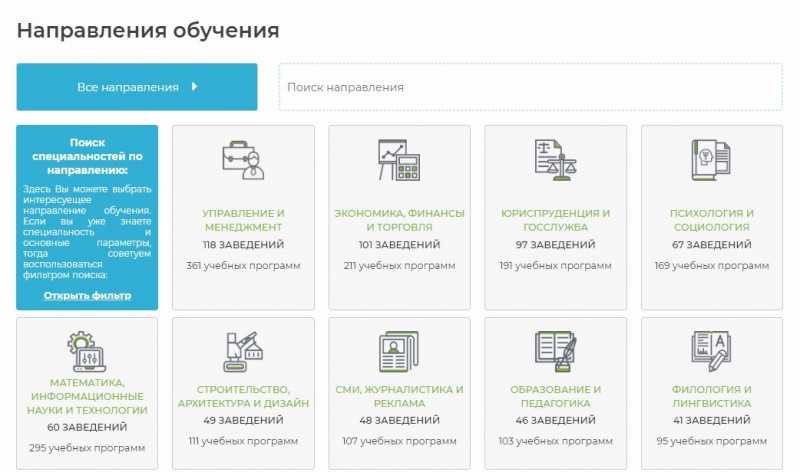
They also have such term as gap year. It means that after finishing school, a person can spend a year traveling around the world and looking for different options of how to continue their education. In Russia, however, many students seem to be dissatisfied with their choice as early as during their second year.
My other task is to create a service where students will be offered a feasible picture of opportunities that they’ll get from studying in that or another university.
How does the platform work?
The fastest instrument is the search engine. If you know the specialization that you want to follow, you can type it in the search bar, and get information about universities in different regions that offer the associated programs. What’s more, you can choose various filters: for example, you can state which training modes you prefer, what your Unified State Exam scores are and so on. After that, you just browse through the universities that correspond to these parameters.
On the whole, the data for my platform is collected from about ten different sources: governmental websites, social networks, and various educational resources. Also, when you find the webpage of a university that you’re interested in, you can analyze the statistics on their graduates’ wages and employment, as well as learn the minimal Unified State Examination score that you need if you want to apply there. As of now, we have information on about 1,000 educational establishments, both public and private.
What are your future plans for the project?
The website you can see now is an old version. Soon, we’ll be using a new platform, and we are going to release an update this April or May. I hope that very soon, we’ll be able to present it to the applicants who want to start their education this year. As of now, we are mostly working on the design and additional functions.
In the future, we plan to start collecting feedback by current students, as well as increase our data pool on foreign universities. After all of that is done, we’ll think about launching a series of overview videos.
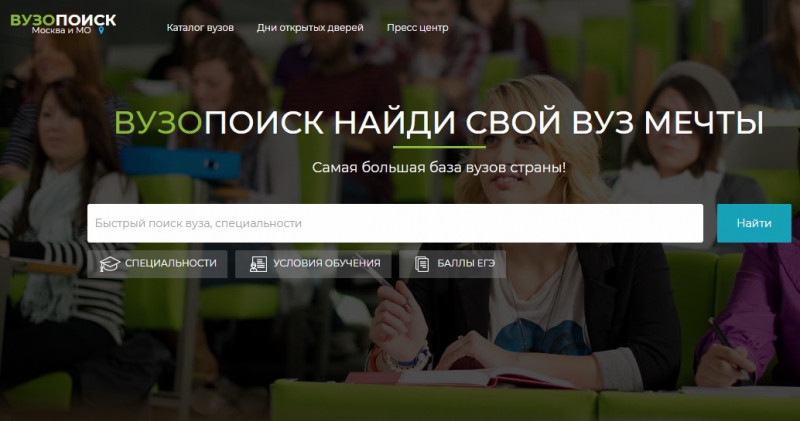
The first thing on your website that caught my attention was the slogan: “Find your dream university!”. What would your dream university be like? What are the qualities that a modern educational establishment has to possess?
I think that it’s most important to establish cooperation between a university and businesses. At many universities, and it’s not only the Russian universities that I’m talking about, there exists an issue of their programs’ relevance. To my mind, a dream university is a university whose lecturers are strong practitioners, ideally specialists from major companies who can share their experience.
Secondly, the ways of organizing the educational process and conveying information are important factors, as well. Information has to be provided in a user-friendly, interactive manner, moreso modern technologies make it possible to record lectures on video. This is a great opportunity, especially for those studying remotely.
What is also important is when a university hosts exhibitions and open events with real experts on a regular basis.
